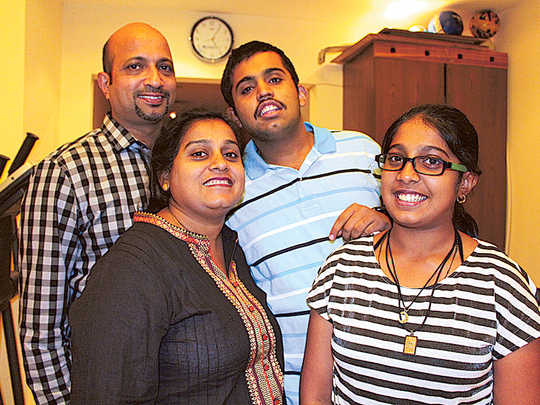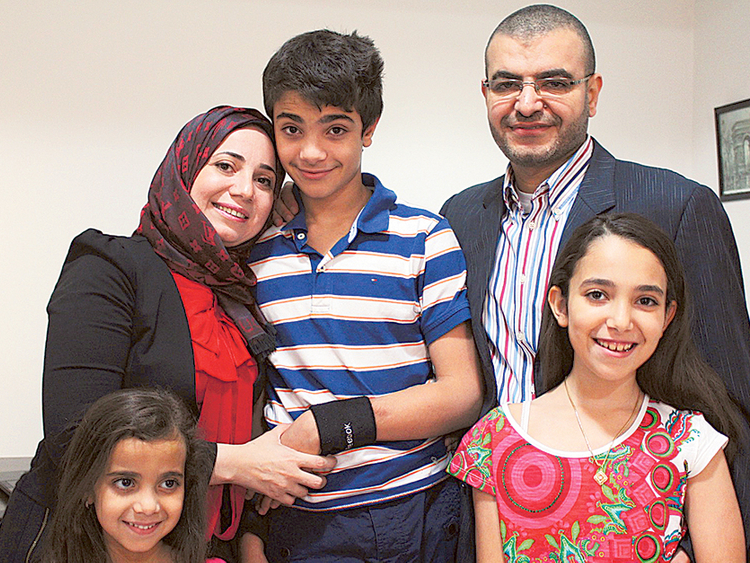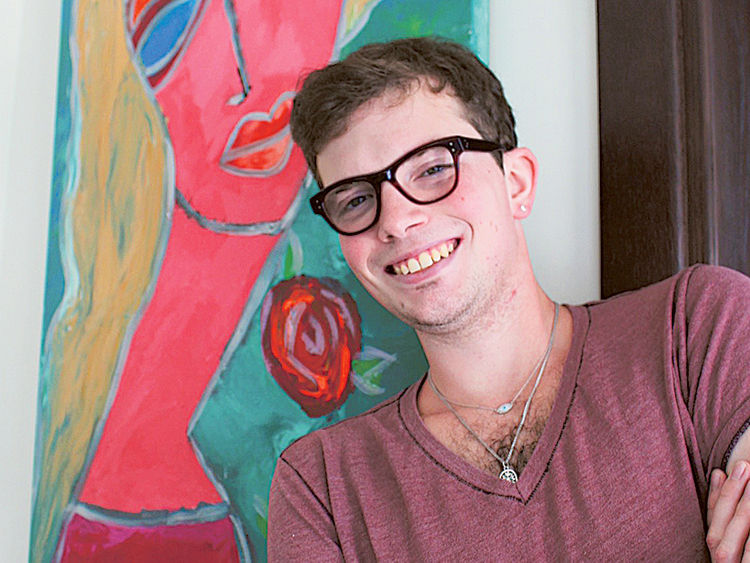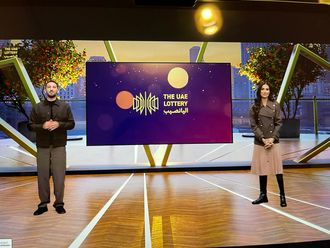
Dubai: In the welter of issues on autism, a condition that has been gaining increasing attention over the years as it becomes more prevalent globally, one thing that is little highlighted is the derisory attitude of mainstream society when confronted with individuals with autism.
Rarely addressed and much less acknowledged, this social insensitivity is among the many challenges faced by families of children with autism.
Society’s lack of compassion and insight into the daily struggles of individuals with autism, and their caregivers, is a serious issue that requires as much attention and focus as does the larger issue of how to ensure that these individuals are provided with a means of self-support after the age of 18, the time when they leave the specialised centres that offer management and care.
At the heart of every individual with autism’s story is the heart-rending cry, “When will I be truly understood for who I am and what I can give to society?”
Statistics on autism
Autism Spectrum Disorder (ASD), referred to as autism, is a condition that affects social interaction, communication, interests and behaviour. While this is generally known, what is little focused on is the day-to-day challenges of living with autism, not just for the person affected by it but also by the caregivers or families involved.
There are no statistics available on the number of people diagnosed with autism in the UAE. Most autism centres in the country are operating at full capacity and have long waiting lists. Many children with autism do not attend schools because their families cannot afford the hefty school fees.
“There is an epidemic of autism, which is an international problem. Twenty years ago, one in 1,500 people was diagnosed with autism. Today, it is one in 63,” said Dr Madeleine Portwood, director of clinical services for Ebdaah, Dubai-based consultancy, with over 25 years experience in the field. “My observation as a psychologist is [that it is] about one in 40.”
To understand what individuals with autism go through, a basic understanding of some of the stereotypical behaviours related to the neuron-biological disorder is required.
Some of the behaviours include hand clapping, spinning and finger gazing. Rigid interests or rigid thinking is another common behaviour which can make it difficult to make a transition from one activity to another.
Typically, a child with autism does not want to interact with another person. Often, they will have language but they will not use it for social interaction. Some on the spectrum can have high sensory or tactile issues, which results in an intolerance of loud sounds and, in the case of the latter, they like to touch things or do not want to be touched at all.
Since it is a spectrum disorder, not all children on the spectrum show stereotypical behaviours. “Ultimately, these youngsters are going to have to socialise and go out in the world and we have to give them those skills,” said Dr Portwood. “For parents, it’s an emotional journey, because they have the concerns — having been told that their child has autism — and they will have ideas about what that label means and they will have concerns for their child’s future,” she said.
Dr Portwood says, “If the child has a physical disability that’s accepted [in public]... people are sympathetic. If you have a child with autism, there is nothing physically [different] you see immediately — but they behave in an unusual manner, making noises, waving their arms and immediately people pass comments about how poorly the parents of this child are managing their child.”
The truth is, said Dr Portwood, that parents of children with autism want to tell people, “Do you realise my child has this condition?” One of the biggest challenges, she said, is “other people’s perceptions that people and families with autism have to deal with.”
This social marginalisation of individuals with autism, and sometimes even of their families, has no place in a progressive world.
Gulf News enters the deeply personal world of individuals with autism and learns from their families how social indifference and insensitivity of society can place an unbearable stress on their already difficult circumstances.
The Noronhas
At first glance, Calvin looks like a typical 18-year-old, except he does not have many words to share. He speaks only a few and he does not make much eye contact.
Diagnosed with autism at the age of three, he displays some of the typical behaviours associated with autism such as rocking back and forth and flapping hands.
According to his parents, Leslie and Meena, he cannot be left alone and someone has to always accompany him when they are out to ensure he does not get lost.
Calvin’s diagnosis completely changed the Noronhas’ lives. Meena had to give up her job as a lawyer and stay home to provide her son with the support he needed, including tuition due to lack of availability of specialists and their cost.
The adaptation to their changed life, unexpected as it was, was something they faced with all the equanimity they could muster, but what tested them was the reaction of people, even close friends.
“People tend to stare at [us] when we take him out,” said Meena, recalling the aspersions cast on them.
“There are people who said to me, ‘You must have sinned so much to have had a child like this. Why are you out enjoying yourself? You should be sitting at home and crying to God for forgiveness’.
“We lost so many friends… some close friends don’t want to be with you because they feel their children might pick up some habits from your child. They think your child is mad or they say your child has serious issues, so they don’t want to be around you,” she said.
Calvin loves to go out on his bicycle with his father. “When my son went out to play in the building’s premises, other families would call their kids back.”
These responses apart, there was the litany of advice that rained on her based on the assumption that her son’s behaviour was correctable as it was owing to poor parenting.
“Each person, even if they are not parents themselves, will start advising you about how to bring up your child. They think it is bad behaviour or bad parenting. When we go on the metro, I have to take him in the ladies section. He is a big boy, so people object. If he behaves funny… they start staring and laughing at you,” she said.
Calvin’s sister, Calisha, four years his junior, has also been at the receiving end of social barbs.
“My daughter has lost friends, parents didn’t want their children playing with her,” said Meena. “Many a time, if my daughter is playing with her friends and Calvin goes to join her, the other girls move away. They have stopped inviting her [Calisha] to birthdays because she has a brother with a problem.”
And then there was the time when, during a visit to a mall, Calvin, in a nervous episode, accidentally touched a woman and Meena was told by the woman that she ought to lock up her son at home.
Over repeated episodes of social insensitivity, Meena has learnt to protect her emotions. “Earlier it used to hurt us very much. I would come home and cry. But now we pity people who say such things,” said Meena.
Now that Calvin is 18, the family faces a new set of challenges the dominant of which — apart from the yearly visa renewal, identity papers, health insurance — is the worry that he will be asked to leave his school soon as he is now 18. How will life change for Calvin when he leaves school?
The road ahead at the moment is a question mark for the Noronhas.
Meanwhile, they have a message for society.
“We are already struggling physically, spiritually, mentally, financially. These are burdens enough. Do not add to them by staring, commenting and making our life more difficult.
“Perhaps you can’t say a few good words. You can’t help [us]. But please don’t criticise or judge.
“When you have a special needs child, one thing they don’t have is patience. Specially with children with autism, their behaviour could change any minute.
“When the child is having a meltdown, don’t crowd around, don’t make faces, don’t make hurtful remarks. This alone would help make life for us better. “
Ahmad Hegazys
Imagine if you could not filter out sounds, if you could hear everything — the sound of the air conditioning as if your ear was pressed against it, sounds of people talking in a room all at the same time, each person’s voice coming clearly to you, the sound of a colouring pencil against paper, every scratch of the pencil booming... This is what Ahmad Hegazy, a child with autism and with high sensory issues, has to deal with on a daily basis. His world of sounds is so amplified, it turns the world into a very scary place for him. It explains why, suddenly, children like him cover their ears or react differently in crowded areas.
Ahmad is 13 years old and was diagnosed with autism at the age of two. Apart from high sensory issues, he is also non-verbal and when he feels pain in his jaw, he bites his wrist to relieve the pain.
“I took him to see a speech therapist and he told me bluntly that it was a case of autism. Though I was in the medical field, I didn’t know what autism was. [To me] it was just a word in a book I read a long time ago,” said his mother Eman.
Eman went home and searched the term. “It was a very bad day,” she recalled of that time. “There is no cure, no treatment, there are a lot of approaches but nothing concrete.”
Ayman, Ahmad’s father, rues the lack of a definitive course of treatment for autism. “There is no evidence-based medicine [for autism]. It’s trial and error and what works for you doesn’t mean it can work for someone else,” he said.
Eman left her job and became a full-time mum to support her son. “My priority was my son, I wanted to help him with all my power. I was with him 24 hours.”
The family was aware of how important early intervention is with autism and they enrolled Ahmad at the Dubai Autism Centre immediately, where he still attends school.
His parents were keen to make sure he socialised frequently and tried to get him into classes such as swimming and horse riding. However, they struggled to find the right support.
“It was very difficult to find specialists and, when you find them, they are very expensive,” said Eman.
Most specialists Gulf News contacted had a starting price of Dh350-Dh400 per hour.
The family have had their fair share of struggles and their experiences of social responses to Ahmad’s condition echo the Noronhas’ experiences. Someone even tried to make a police case out of Ahmad accidentally biting another child, which occurred when he was trying to bite his own hand to relieve the pain in his jaw.
Their two younger daughters have had to cope with other children calling their brother ‘weird’ and ‘strange’.
Society’s attitude, however distressing, pales in comparison with the prospect of Ahmad’s future as he gets closer to 18. What does the future hold for him? “There are no specialised centres for children with autism after 18, no rehabilitation centres after this age. So where do we parents go? After 18, they are asked to leave school,” Eman said.
“Will he have to simply sit at home after 18?,” she wonders.
The Hegazys ask of society:
“We didn’t chose to have him like that and he didn’t chose to be like that. So please understand and please don’t judge.”
Alex Loveday, 23, American expatriate with autism
Alex Loveday is on the high functioning end of the autism spectrum. With a particular talent for the arts and designing jewellery, he hopes to be a jewellery designer.
Loveday also has a special talent whereby he can memorise movies and play them back in his mind when he chooses. He can watch up to six movies at a time in his mind.
Growing up like so many other people with autism, he was bullied and teased because of his condition.
“It was about how I reacted to things. They would say there was a spider on a wall and I would say like, ‘Ooooooh’ [he screams in a high-pitched voice] and they would laugh. I hated that.
“Other kids made fun of the way I spoke. Once they were trying to get me to pull down my pants and I was like no way.
“One time a kid beat me up on the bus for sitting on a seat. My heart was in pieces and my eyes were full of tears. It wasn’t nice how they did that to me.”
“I have feelings too.”
His message for people who meet him and are unsure of his appearance, reactions and voice is:
“Don’t judge [people with autism] for how they look or act in public. Just make them feel welcome. Treat them with respect, treat them like other people.”
Mohammad* 21, high functioning individual with autism
On the high end of the autism spectrum, Mohammad was diagnosed with autism recently. While his speech and understanding of logical matters are above the average level (such as mathematics and physics), he struggles with social interactions and he admits to having never cried and not understanding crying.
“Small talk doesn’t interest me but if something interests me, I can talk about it for hours, which exhausts people.”
He said knowing that he was different and being teased by people for not understanding social issues like what to do and what not to do puts a strain on his brain and completely exhausts him.
“I got teased, bullied… I speak differently, act differently, had strange mannerisms, tics, physical and verbal. I kept to myself a lot, I never used to cry. Most of the time I liked being in my own world. I was never able to identify with anyone else. There was a hierarchy in which I felt like I was below.” Mohammad thinks the reason he was diagnosed so late was because his family did not want to accept that their child may have some sort of special needs. “There is a taboo against this kind of thing culturally.”
He hopes to be able to address his needs through training and not be held back by a label. He aspires to continue studying and possibly have a research career in physics.
*Not his real name.














